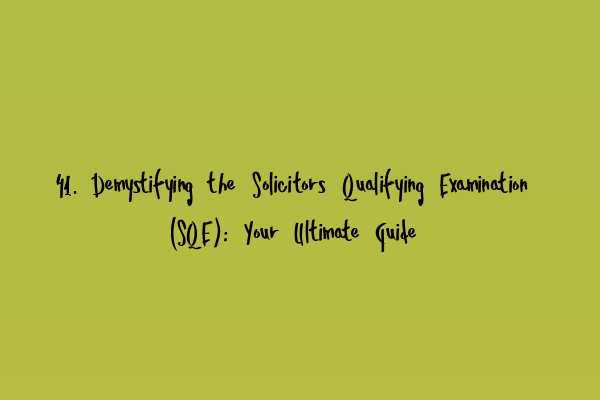Demystifying the Solicitors Qualifying Examination (SQE): Your Ultimate Guide
If you’re considering a career as a solicitor, you’ve probably come across the Solicitors Qualifying Examination (SQE). But what exactly is the SQE and how does it work? In this comprehensive guide, we’ll demystify the SQE, providing you with all the information you need to know before embarking on this important journey. Let’s dive in!
What is the Solicitors Qualifying Examination (SQE)?
The SQE is a new assessment that individuals must pass in order to qualify as a solicitor in England and Wales. It replaces the previous route to qualification, which consisted of the Legal Practice Course (LPC) and the Professional Skills Course (PSC).
The SQE is designed to ensure that all solicitors possess the necessary knowledge and skills required to practice law effectively. It consists of two stages: SQE1 and SQE2. SQE1 assesses your functioning legal knowledge, while SQE2 evaluates your practical legal skills.
What does the SQE1 consist of?
SQE1 is a multiple-choice examination that tests your knowledge across a range of legal subjects. It covers topics such as contract law, criminal law, property law, and more. The exam is divided into two parts, each consisting of 180 multiple-choice questions. Each part lasts for two and a half hours.
To prepare for SQE1, it’s crucial to familiarize yourself with the key concepts and legal principles covered in the examination. Practicing with SQE sample papers can be an effective way to improve your understanding and boost your confidence. (For more information, check out our article on SQE Sample Papers: Practice for Exam Success).
What does the SQE2 entail?
SQE2 is a practical examination that tests your ability to apply legal knowledge in real-life situations. It consists of a series of simulated legal tasks that assess your skills in areas such as client interviewing, advocacy, legal research, and drafting. SQE2 is designed to replicate the challenges you may encounter as a solicitor, allowing you to demonstrate your competency.
Mastering key concepts and practicing relevant skills are essential for success in SQE2. Therefore, it’s crucial to focus on the specific areas assessed in this stage. To learn more about the key concepts and skills covered in SQE1 and SQE2, check out our article on Focus Areas in SQE1 and SQE2: Mastering Key Concepts.
How can you prepare for the SQE?
Preparing for the SQE requires a combination of focused study, practical skill development, and exam practice. Here are some tips to help you develop an effective SQE strategy:
- Start early: The SQE is a comprehensive assessment, so it’s essential to begin your preparation well in advance.
- Create a study plan: Break down your study time, allocate specific topics for each session, and set achievable goals.
- Seek professional guidance: Enrolling in an SQE training program can provide you with expert guidance and support throughout your preparation journey.
- Practice with mock exams: Mock exams are a valuable tool for gaining familiarity with the format and style of the SQE. Analyzing your performance in mock exams can also help you identify areas for improvement. (For more tips on adjusting your SQE strategy based on mock performance, check out our article on Adjusting Your SQE Strategy Based on Mock Performance).
- Participate in debrief sessions: After completing a mock exam, it’s essential to review and analyze your answers. Participating in SQE mock debrief sessions can provide you with valuable insights and tips for improvement. (For more information on the importance of mock debrief sessions, check out our article on SQE Mock Debrief Sessions: Critical Steps for Improvement).
- Utilize SQE sample papers: Practicing with SQE sample papers can help you become more familiar with the exam format and structure, as well as improve your overall scores. (For tips on how to elevate your scores with SQE sample papers, check out our article on Practicing with SQE Sample Papers: Elevating Your Scores).
Conclusion
The SQE is a rigorous assessment that ensures aspiring solicitors possess the necessary knowledge and skills to excel in their profession. By understanding the structure and requirements of the SQE, and by implementing an effective study and practice strategy, you can increase your chances of success.
Remember to regularly review the related articles mentioned in this guide for more detailed information and tips on preparing for the SQE. Best of luck with your SQE journey!
